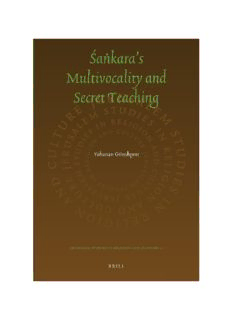
The Secret Śaṅkara: On Multivocality and Truth in Śaṅkara’s Teaching PDF
Preview The Secret Śaṅkara: On Multivocality and Truth in Śaṅkara’s Teaching
The Secret Śaṅkara Jerusalem Studies in Religion and Culture Editors Guy G. Stroumsa David Shulman Hebrew University of Jerusalem Department of Comparative Religion VOLUME 12 The Secret Śaṅkara On Multivocality and truth in Śaṅkara’s teaching By Yohanan Grinshpon LEiDEn • bOStOn 2011 This book is printed on acid-free paper. Library of Congress Cataloging-in-Publication Data Grinshpon, Yohanan, 1948– The secret Śaṅkara : on multivocality and truth in Śaṅkara’s teaching / by Yohanan Grinshpon. p. cm. — (Jerusalem studies in religion and culture ; volume 12) includes bibliographical references and index. iSbn 978-90-04-18926-3 (hardback : alk. paper) 1. Sankaracarya. 2. Hindu philosophy. i. title. b133.S5G75 2011 181’.482—dc22 2010042537 iSSn 1570-078X iSbn 978 90 04 18926 3 Copyright 2010 by Koninklijke brill nV, Leiden, The netherlands. Koninklijke brill nV incorporates the imprints brill, Hotei Publishing, iDC Publishers, Martinus nijhoff Publishers and VSP. All rights reserved. no part of this publication may be reproduced, translated, stored in a retrieval system, or transmitted in any form or by any means, electronic, mechanical, photocopying, recording or otherwise, without prior written permission from the publisher. Authorization to photocopy items for internal or personal use is granted by Koninklijke brill nV provided that the appropriate fees are paid directly to The Copyright Clearance Center, 222 Rosewood Drive, Suite 910, Danvers, MA 01923, USA. Fees are subject to change. in Memory of Wilhelm Halbfass (1940–2000), A Philosopher and teacher COntEntS Preface and Acknowledgment ........................................................... ix Chapter One On the Challenge of Listening to Śaṅkara’s Voices: Dialogue and Monologue in Śaṅkara’s Writing ........... 1 Chapter two On Doubt and Wonder in Advaita-Vedānta: towards Perceiving a Śaṅkara and a Śaṅkarācārya ................... 9 Chapter Three Ātman Disturbed: Self and Mind as its Other in the Upadeśa-sāhasrī ................................................................... 23 Chapter Four individual Losses and Advaitic Consciousness: A note on Īśvara’s, Śaṅkara’s and Śaṅkarācārya’s Sorrow ....... 33 Chapter Five On Doubt and Self-Understanding: The Omniscience of an Author and his Arch-Exponent .................. 51 Chapter Six Śaṅkara’s Śaṅkarācārya: The invisible Author of bSbh and his beloved Siddhāntin ............................................ 63 Chapter Seven On Rice and Mokṣa: A note on Śaṅkara’s Voices and Aesthetics .................................................................... 91 Chapter Eight On Mud, negation and the Hungry Space ......... 101 Chapter nine Advaita Messages and Foreign Voices: Some Philosophical Meanings of Śaṅkara’s Art of Writing ................ 115 Chapter ten Commentator’s Advaita, Exponent’s Advaita ...... 139 Epilogue The Useless Knowledge of Self as the Highest Good: A note on Śaṅkara’s Secret teaching of Viveka-Vedānta ........ 157 bibliography ......................................................................................... 173 index ..................................................................................................... 175 PREFACE AnD ACKnOWLEDGMEnt Primordial error with respect to a self that is intimately sensed yet little understood—this is the ground of life as we know it. We exist through a manifestion of self that is essentially false, blind to the rela- tionship between our self and non-self even as we walk and speak, read or think. it is no wonder, then, that the sage who would articulate this stark truth remains in the shadows, concealed, as it were, behind alleged truths that are more acceptable and sanctioned by tradition. in the introduction to his commentary on the Brahma-sūtra, Śaṅkara, author of the Brahma-sūtra-bhāsỵ a (bSbh), suggests that it is primor- dial error—the common lot of human beings and animals—that sus- tains our life (or embodied existence). The error, he states, comes about through the superimposition (adhyāsa) of that which sees—“having an object” (visạ yin)—on that which is seen (an object) (visạ ya), and vice versa. Every voluntary movement of the body requires a measure of false self-identification, or to quote his own words: “The body can only be set in motion through an inherently erroneous projection of the self on a non-self [which is the body]” (na cânadhyastâtma-bhavena dehena kaścid vyāpriyate). This, as i read it, implies that a sage who has become wholly free of adhyāsa would cease to move his tongue (to speak) and his hands (to write), attaining thereby a high degree of dense silence. but for a philosopher committed to coherent speech, the condition of not mov- ing his tongue and hands presents a paradox. Mindful of the theory of adhyāsa Śaṅkara realizes that the speech-act “i do not exist” (nāham asmīti; bSbh 1.1.1) presents a contradiction in terms. nor can he ignore the existential meaning of the paradoxical statement that to live is to exist in error. in the thirteenth section of the metrical part of the Upadeśa-sāhasrī, the one and only self (ātman) speaks in Śaṅkara’s voice: Having no eyes i do not see (acaksụ sṭ ṿ ān na dṛsṭ ịr me); with no ears, how is hearing possible (tathâśrotrasya kā śrutiḥ)?; having no organ of speaking, there is no speech in me (avāktvān na tu vaktiḥ syāt); without a mind, how can i think (amanastvān matiḥ kutaḥ)?1 1 Upad 13.1.
Description: